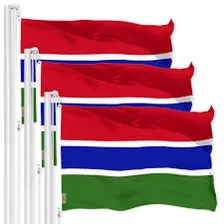Monday, May 19, 2025
Lawyer Melville Roberts Open Letter To President Barrow
By Lawyer Melville Roberts
A Plea for Integrity: Why The Gambia Should Withdraw Its Endorsement of Ba Tambadou for the ICJ
Dear Mr. President, esteemed Gambians,
In the life of a nation, there are pivotal moments when silence can amount to complicity, and the act of speaking out, even at the risk of misunderstanding, becomes essential for the integrity of our nation, our conscience, and our historical narrative. Today is one of those critical moments.
I write to you not out of animosity, nor with any political agenda, but from a place of profound sorrow and unwavering conviction, fueled by my deep love for this country. I understand all too well the weight of justice when it is manipulated, misrepresented, or neglected because I have experienced it firsthand.
The Gambian government’s decision to endorse Mr. Abubacarr Tambadou for a position as judge at the International Court of Justice (ICJ) resonates deeply with our national journey. While it may appear admirable to see one of our own elevated within the ranks of global justice, we must confront a troubling reality that calls for serious reflection.
We must not be deceived by titles or accolades. True character is revealed not by the allure of global platforms but by the positive impact made at home.
In the past, Ba Tambadou ignited hope. As the Attorney General and Minister of Justice, he stood as a symbol of renewal for a nation emerging from two decades of dictatorship, holding the aspirations of victims in his hands. He was positioned to honor our shared pain with fairness, truth, and humility.
Yet, Mr. President, those hopes have been dashed.
To many, Ba Tambadou will not be remembered as a champion for justice but as a gatekeeper, determining who received justice, when, and under what circumstances. His tenure was marred by selective prosecutions and inconsistencies in upholding the spirit of the Truth, Reconciliation, and Reparations Commission (TRRC), revealing a disheartening trend of protecting the powerful while relegating victims to the shadows.
I urge you to consider the families still searching for justice, the survivors who witnessed perpetrators evade accountability, and the countless individuals who have endured suffering only to be told that some lives are worth more than others when it comes to justice.
Beyond the courtroom and commissions, a more profound issue remains: the management of former President Yahya Jammeh’s assets. Under Ba Tambadou’s watch, the sale and disposal of these properties—ill-gotten gains from a suffering nation—have raised serious concerns regarding transparency and ethical conduct.
Accusations of selective auctions, undervalued asset sales, and a lack of clear revenue channels cannot be ignored. Properties that belonged to the people of The Gambia have been sold off, but to whom and at what price? Why has there not been a clear public account of the recovered wealth, and whether it was truly returned?
Additionally, troubling reports concerning the accuracy of translated legal documents persist. Allegations of misrepresentation or selective interpretation have clouded proceedings that should have been unassailable. Such issues do not represent minor grievances; they strike at the very foundation of justice, suggesting manipulation rather than fairness.
How can we expect an individual characterized by such controversies, however eloquent, to adjudicate matters involving genocide, war crimes, and global accountability?
The ICJ is not merely a trophy to reward political affiliation or global praise; it stands as the last resort for the world’s gravest injustices. It demands unwavering integrity, independence, and a transparent history that can endure global scrutiny.
Mr. President, this decision transcends politics. It defines who we are as a people. It will determine whether the victims of Jammeh’s regime perceive justice as a hollow performance or a genuine truth. It will signal whether The Gambia, the smallest country on the African mainland, can continue to be a beacon of moral courage—not just in words but in deeds.
Endorsing Ba Tambadou is not a neutral act; it implicitly suggests that his actions in The Gambia were acceptable. It tells the victims of Yahya Jammeh’s regime that the individual who oversaw their initial quest for justice, despite falling short, is now fit to pass judgment on global atrocities.
That message is deeply flawed and profoundly damaging...See More
Subscribe to:
Post Comments (Atom)




No comments:
Post a Comment